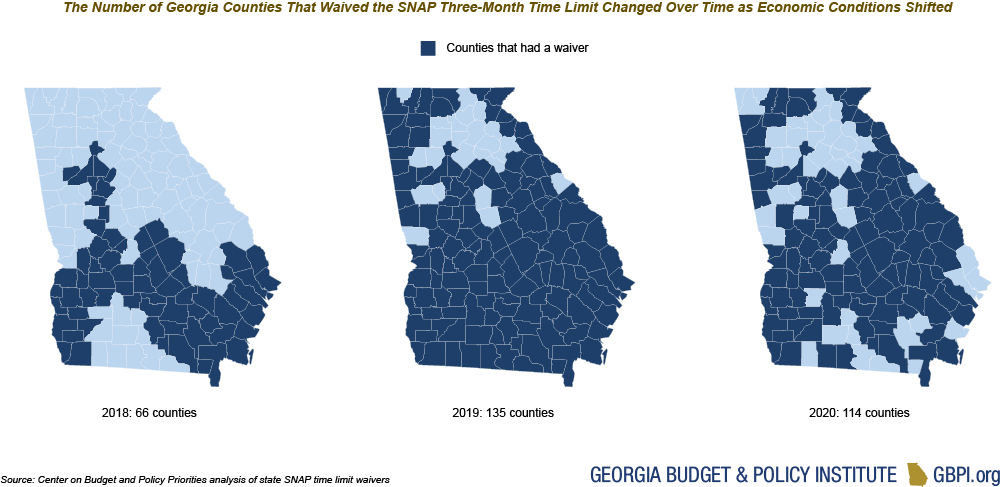Georgians recognize that when an individual cannot find a job or when the state experiences economic hardship, supports to help people afford food are critical. The Supplemental Nutrition Assistance Program (SNAP, formerly known as the Food Stamp program) does just that. However, there is a rule within the SNAP program that punishes some individuals when they cannot find work. The SNAP three-month time limit cuts off working age adults not living with children who are neither employed nor in a work training program.[1]
To prevent the worst harm, the state can request a waiver, a temporary exemption, from this rule for either the whole state or certain geographic regions that struggle with persistently high unemployment or have experienced a severe economic downturn. Senate Bill 557 would eliminate Georgia’s ability to waive the time limit no matter the economic conditions, risking an increase in food insecurity and hunger for many Georgians who live in areas where jobs are scarce. Recent research adds to the growing body of evidence that the SNAP time limit does not have a positive effect on work. Currently, the federal government has suspended the time limit for every state given the economic fallout from the pandemic, but that will end June 30, 2022.
SNAP’s Three-Month Time Limit is Cruel Given the Realities of Many Adults Working for Low Wages
Adults subject to the time limits are demographically diverse, and many work when they can, but often in low-paying, unstable jobs. These jobs create a lot of employee turnover and are less likely to meet the requirements for unemployment compensation. Additionally, many unemployed adults not living with children may have significant barriers to stable employment like a mental or physical limitation (which should exempt them from the time limit, but the state agency may be unaware of the issue), transportation challenges and housing instability. SNAP is one of the only supports available to this group when they experience hardship.
Unsurprisingly, the assumption that the SNAP time limit increases employment is not supported by the research. A recent report commissioned by the U.S. Department of Agriculture, the federal agency that administers SNAP, found that the time limit “does not substantially increase work or earnings.” With few resources, taking away unemployed adults’ food assistance will likely not help them find a job but could put them at a very real risk of food insecurity and negative health outcomes.
Georgia’s Waiver Flexibility Offers Protections to Adults Living in Regions with Few Jobs
The flexibility of issuing waivers from the time limit has allowed the state to offer temporary protections to adults living in regions where few jobs are available. A state or county must meet strict eligibility requirements related to labor market conditions in order to waive the time limit. Since local economic circumstances can change from year to year, the number of counties eligible for a waiver may also change. For example, in federal fiscal year (FFY) 2018, 66 counties had a waiver. That grew to 135 counties in FFY 2019 and then dropped down to 114 counties in the first half of FFY 2020. (See graphic.)

The three-month time limit for unemployed adults not living with children does not help improve employment outcomes or food security. While it is up to federal policymakers to end the time limit for good, state lawmakers should not make it hard for Georgia to offer protection from the time limit where it can. While not perfect, this flexibility is an important tool to help Georgians afford food during hard economic times.
Endnotes
[1] Adults who fall into this group are between the ages of 18 and 49. The federal government does not require state to offer work training slots to adults not living with children and does not provide sufficient funding through SNAP for job preparation, placement and retention. Camardelle, A. (July 9, 2018). SNAP provides a lifeline to Georgia’s adults navigating hard times. GBPI. https://gbpi.org/snap-provides-lifeline-to-georgia-adults-navigating-hard-times/#_ednref12

